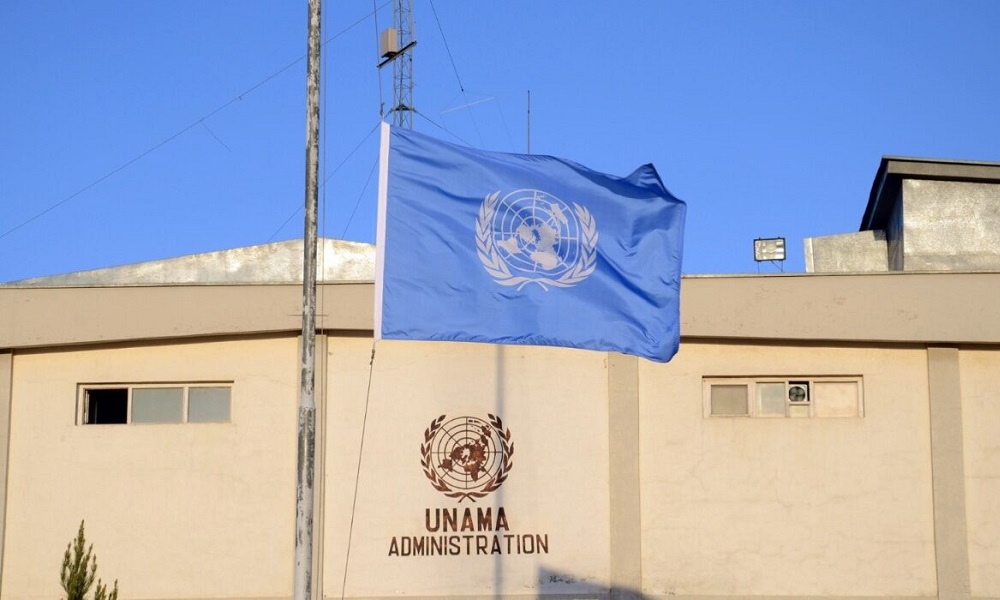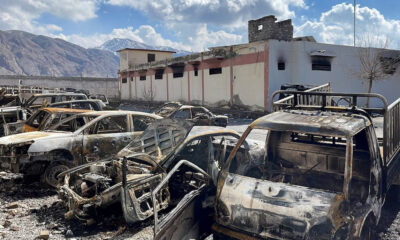Latest News
Taliban would roll back Afghan women’s rights -U.S. intelligence report

The Taliban “would roll back much” of the progress made in Afghan women’s rights if the Islamist extremists regain national power, according to an assessment released on Tuesday by top U.S. intelligence analysts.
The U.S. National Intelligence Council report likely will reinforce fears that the Taliban will resume the harsh treatment that women and girls suffered under their 1996-2001 rule should the insurgents prevail in a full-blown civil war.
“The Taliban remains broadly consistent in its restrictive approach to women’s rights and would roll back much of the past two decades of progress if the group regains national power,” said the U.S. intelligence community’s top analytical body.
At the same time, the council’s “Sense of the Community Memorandum” said women’s rights likely would be threatened after the U.S.-led military coalition withdraws, a finding reflecting the conservative nature of Afghanistan’s male-dominated society.
“Progress (in women’s rights) probably owes more to external pressure than domestic support, suggesting it would be at risk after coalition withdrawal, even without Taliban efforts to reverse it,” the assessment said.
U.S. President Joe Biden’s decision last month to withdraw the last 2,500 U.S. troops – triggering a pullout of other foreign forces – is fueling fears Afghanistan could plunge into an all-out civil war that could return the Taliban to power.
Those concerns have been stoked by a deadlock in U.S.-backed peace talks, while the Taliban have intensified attacks on government forces after a missed May 1 deadline for the U.S. troop departure.
Before being ousted by the 2001 U.S.-led invasion, the Taliban imposed a harsh version of Islamic rule that included barring girls from school and women from working outside their homes and prohibiting them from being in public without a male relative.
Women who violated those rules often suffered humiliation and public beatings by the Taliban’s religious police.
The new report, however, noted that many of those practices have continued in government-controlled areas and “years of war have left millions of women maimed, widowed, impoverished and displaced.”
Gains made in women’s right have been touted as a major accomplishment during the 20 years that U.S.-led forces have been deployed, although mostly in urban centers.
The Biden administration has pledged to continue civilian assistance after U.S. troops depart, including to women’s programs. But it has warned that Afghanistan would suffer isolation and sanctions if it backslides on human rights.
A February 2020, U.S.-Taliban accord struck by the Trump administration specified a May 1 deadline for completion of a U.S. troop withdrawal from America’s longest war.
Biden, however, decided to complete the withdrawal before the anniversary of the Sept. 11, 2001, al Qaeda attacks on the United States that triggered the U.S.-led invasion.
Latest News
Tajik foreign minister urges international community to help Afghanistan address its challenges

Tajikistan’s Minister of Foreign Affairs, Sirodjiddin Mukhriddin, has called on the international community to step up assistance for Afghanistan as the country continues to face challenges.
Speaking at a press conference, Mukhriddin said Tajikistan and Afghanistan maintain active coordination between their law enforcement agencies to prevent security incidents along their shared border. He noted that this cooperation remains essential, as the frequency of armed attacks and criminal activity in border regions has increased in recent months.
He said that Afghan authorities had assured Tajikistan they would take necessary measures to stop further incidents and would conduct thorough investigations into any violations.
Mukhriddin emphasized that Tajikistan supports constructive international engagement aimed at improving Afghanistan’s socio-economic conditions. He highlighted that Tajikistan has provided more than 6,000 tons of humanitarian aid to Afghanistan, including food and essential supplies delivered in 2025 to assist communities affected by devastating earthquakes.
The minister also pointed to growing economic cooperation between the two neighbors. Tajikistan has reopened border markets and continues to supply electricity to Afghanistan.
Tajikistan and Afghanistan share a border of more than 1,300 kilometers—over 1,100 km of which consists of waterways and about 190 km of land boundaries.
Meanwhile, Zafar Samad Director of the Drug Control Agency under the President of the Republic of Tajikistan, has said that last year, 17 incidents of clashes happened with drug smugglers along the border with Afghanistan. As a result, two Tajik forces and 10 Afghan nationals have been killed, he added.
Latest News
Baradar: Afghanistan is not an easy target, but a ‘bitter tree’

Mullah Abdul Ghani Baradar, Deputy Prime Minister for Economic Affairs, warned during a graduation ceremony for soldiers of the Ministry of National Defense that the Islamic Emirate will respond decisively to anyone with ill intentions toward Afghanistan.
He said the country is “not an easy target, but a bitter tree that has made the throats of empires bitter and newborns can never digest.”
Baradar also announced that in the coming days, the Islamic Emirate will introduce tax exemptions of one to five years for domestic and foreign investors, based on the level of investment in new sectors. He also said that the process of distribution of land to manufacturers will be accelerated.
Baradar called on countries to engage in political and economic relations according to the values and principles of the Islamic Emirate, emphasizing that energy and resources spent on conflict would be better used to support one another and strengthen common interests.
Latest News
Fourteen former Afghan government forces killed in last three months of 2025: UNAMA

The United Nations Assistance Mission in Afghanistan (UNAMA), in its latest report on the human rights situation in Afghanistan, stated that 14 members of the former Afghan government forces were killed in the last three months of 2025.
The report noted that during this period, there were 28 cases of arbitrary arrest and detention, and at least seven cases of torture and ill-treatment targeting officials and personnel of the former Afghan government.
According to the report, some of the officials and forces who had recently returned to Afghanistan from Iran and Pakistan were among those subjected to extrajudicial killings, arbitrary arrests, and detentions.
The report also highlighted restrictions on women’s work and movement, executions and flogging of individuals, and disruptions to internet and telecommunications services.
-

 Sport5 days ago
Sport5 days agoHosts and heavyweights advance as AFC Futsal Asian Cup reaches semifinals
-

 Latest News4 days ago
Latest News4 days agoTerrorist threat in Afghanistan must be taken seriously, China tells UNSC
-

 Latest News5 days ago
Latest News5 days agoUzbekistan, Pakistan advance Trans-Afghan railway project
-

 Sport5 days ago
Sport5 days agoWinter Olympics finally underway, ATN to broadcast exclusively across Afghanistan
-

 Sport4 days ago
Sport4 days agoAfghanistan beat West Indies in final T20 WC warm-up match
-

 Latest News1 day ago
Latest News1 day agoAfghanistan to grant one- to ten-year residency to foreign investors
-

 Sport3 days ago
Sport3 days agoIndonesia shock Japan to reach historic AFC Futsal Asian Cup final
-

 Regional5 days ago
Regional5 days agoPakistan sends helicopters, drones to end desert standoff; 58 dead
























